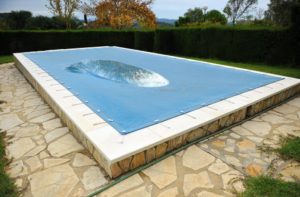With summers receding in most parts of the world, it’s the right time to buy pool covers or pool enclosures before the temperatures start to dip. Many of you already have your winter pool safety covers accumulating dust & dirt in one corner of your garage. Still, some are curious to know the different options available in the market.
This article will discuss the detailed comparison of the two most popular categories of pool covers. First category is the solid pool covers, while the other is the mesh covers. Each of the types has its own set of pros & cons, which we’ll compare today.
So, without wasting any further time, let’s get started.
What is Mesh Pool Cover?

A cost-friendly pool cover type, a mesh cover is made out of permeable material that keeps out dry leaves and debris. These pool covers support a considerable amount of weight, including water and snow load.
How? Because a mesh pool cover doesn’t let water & snow accumulate on its surface, instead, allow it to drain into the pool cover.
So, this minimizes the frequency of pool maintenance, and you don’t need to drain out the water. In a nutshell, when it’s off-season, you need not visit your pool as there is no upkeep to worry about.
Advantages of a Mesh Pool Cover
- It doesn’t need a pump to get rid of the water.
- Durable
- Light in weight
- Easier to install
- Less expensive to buy
Also Read: What are Pool Alarms
Disadvantages of a Mesh Pool Cover
- Allows the sediment-water to enter your pool.
- Pool water needs to drain out regularly.
- May promote algae growth.
What is Solid Pool Cover?

The significant difference between a mesh and solid pool cover lies in the material. A solid cover is made from solid vinyl material that doesn’t allow the rain/snow water to pass through into the pool. It also blocks the sun’s direct UV rays to cause evaporation, lowering your energy bills.
But, there is a catch: you’ve to pump out snow or rain residing on the pool’s surface now and then.
Advantages of a Solid Pool Cover
- No algae growth
- The pool water stays clean and hygienic.
- Completely blocks the harmful UV rays of the sun from entering your pool.
Disadvantages of a Solid Pool Cover
- Expensive to buy
- Need a professional to install it.
Appearance
When installed properly, both cover the pool’s entire surface and are anchored at the four points. Both are available in a wide selection of color, shape, and size options.
The most striking difference between a solid and a mesh cover is the surface texture. A solid cover is smooth to touch as it has no holes.
But, a mesh cover is very fine; the fiber is meretriciously knitted, but does not allow the water to pass through, but not the debris. They have a more textual appeal compared to a solid cover. Aesthetically, both are designed to enhance your pool’s appearance.
Installation
A mesh pool cover is easy to install, even by a single person, as it is light in weight.
A solid pool cover is much heavier, thus challenging to install. It needs one or more people. So, if you don’t have manpower at hand, you may need to rope in a professional pool company to lay it for you.
Cost of Pool Covers
A mesh cover is less expensive than a solid cover both during the purchase and installation. It usually costs between $1,000 and $2,000, depending upon your pool’s size and shape.
A solid cover cost between $2,000 and $4,000; also, you may have to pay an installation cost between $500 and $100.
Final Words
Unlike a mesh or solid cover, an automatic pool cover is fast and convenient to use. You don’t have to manually spread out to cover the entire surface and manually remove it; everything is done with a push of a button.
Do let us know what works for your home.




